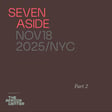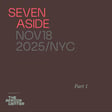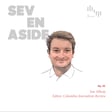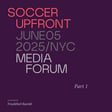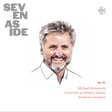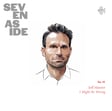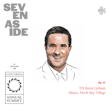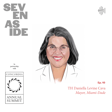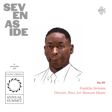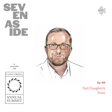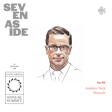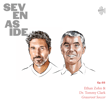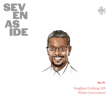Become a Creator today!Start creating today - Share your story with the world!
Start for free
00:00:00
00:00:01

Matthew Swift
The Concordia CEO and co-founder on this moment for relations in the Western Hemisphere, taking a stand on misinformation and trust, a forthcoming immersion in the Amazon, and sport as a crucial pillar of his organization’s approach and proposition
Reference // www.concordia.net
Transcript
Founding and Purpose of Concordia
00:00:00
Speaker
you
00:00:05
Speaker
Matthew Swift arguably was ahead of his time when, in 2011, he and his partners made real a vision for a forum that brings together diverse international cross-sections to discuss, share ideas around, and develop solutions to the pressing economic, social, and environmental issues of our time. That the premise endeavored to transcend political ideologies and emphasize public-private collaboration and market-driven imperatives seems especially prescient 12 years later amid a marketplace and policy environment fertile for a postmodern approach and leadership.
00:00:33
Speaker
Today, the nonprofit Concordia hosts a variety of such convenings around the world and throughout the year, its agenda embodying a range of subject matter focuses and formats.
Annual Summit and Global Convenings
00:00:41
Speaker
Its flagship annual summit in New York City is a cornerstone of UN General Assembly Week each September. On the heels of this year's America Summit, Concordia's seminal regional initiative introduced in 2016,
00:00:52
Speaker
We hear from Matthew on this particular moment for relations in the Western Hemisphere, taking a stand on misinformation and trust, the forthcoming immersion in the Amazon, and with World Cup 2026 on the horizon, media and sport as crucial pillars of the Concordia proposition.
00:01:07
Speaker
Matthew Swift, thanks so much for being on. So to get us started, we're fresh off the 2023 America Summit, which of course is Concordia's longest running regional initiative. Talk, if you would, a bit about the evolution of the summit and give us your immediate takeaways, your readout from this year's convening.
00:01:24
Speaker
Of course, and thank you so much for having me. It was a very productive and successful summit last week focused on primarily a part of the world that everyone at Concordia feels is not being looked at closely enough, is not a part of the world. The rest of the world is not paying attention to enough and
00:01:45
Speaker
That is, in our view, a grave mistake.
Focus on Latin America
00:01:49
Speaker
Concordia is a nonpartisan, nonprofit, convening forum. We are not a think tank, we are not a policy institute. We do not take positions on issues, but we use convening as a very powerful tool to bring together not just leaders from the public and private sectors, but people from all walks of life and socioeconomic status to talk about some of the most pressing issues
00:02:13
Speaker
facing various parts of the world and how public and private sector cooperation can address those issues, how market-based solutions oftentimes represent the best solutions to these issues. As part of that, a strong and vibrant private sector is essential to success there.
00:02:31
Speaker
And Latin America is a part of the world that is representative of a very important population for the global community. It has enormous environmental implications for the rest of the world, especially with the Amazon rainforest. It has very important broader economic and societal impact. What happens in Latin America has effect on the rest of the world. But what I continue to be surprised by is how few institutions
00:02:59
Speaker
are really talking about Latin America. And so I'm very proud of this summit and what we achieved last week, which is part of a larger and longer term strategy to change that. Well, and everything you just said was felt if you were there. And I'm sure if you were watching the summit was certainly representative of all of that.
Opportunities and Challenges in the Western Hemisphere
00:03:17
Speaker
I was struck that the consensus from the summit stage, with certainly some exception, seemed to, and this is going back to your point about the region not being looked at closely enough, and that being such a grave error, there was optimism around this being the threshold of a meaningful reset of cooperation among US and its partners, especially in the hemisphere. Given Concordia's record of being at the center of these conversations, being the convener, what is your assessment of the opportunity at hand for the region, perhaps coming out of this summit?
00:03:47
Speaker
I think that there is a long term opportunity within the region for a number of different reasons, some that are very, very much local and others that are very much global. First and foremost, this is our Americas initiative. So it is not just focused on Latin America, but the Western Hemisphere.
00:04:06
Speaker
Cannot forget we had strong representation for the united states with strong representation from canada. Participating in this summit as well so this is a atmospheric summit which is one of the reasons why it aligns so well with the university of miami as our convening partner in this effort.
00:04:23
Speaker
I think what the opportunity is both a short-term and long-term opportunity, it is both urgent but also requires a great deal of care and consistent focus. I'm a strong believer that within the Western Hemisphere you can develop and build an incredible economic and societal alliance around many shared interests that put the Western Hemisphere in a stronger strategic position.
00:04:52
Speaker
But of course, what it requires is a willingness to navigate a complex geopolitical environment to which the region has within it some of the more complex geopolitical situations, but also setting a clear standard for our region, for our
US Prioritization of Latin America
00:05:09
Speaker
hemisphere. And I say that as a U.S. citizen, as an American. If we approach things with a very forward thinking agenda and criteria, the positive effects of that will be felt
00:05:21
Speaker
in the very near term, and many more of those positive effects will be felt in the long term. The key is that we continue to hone and develop a strategy for cooperation as a pan-hemispheric community, but that those coming in do not necessarily only demand quick, short-term results.
00:05:42
Speaker
While echoing some of your concern around the urgency and the need for focused long-term thinking, I enjoyed Colombian ambassador to the US, Luis Murillo, who was very cheerfully blunt in saying that Colombia and others were, quote, losing momentum in D.C. diplomatically.
00:05:59
Speaker
For all the goodwill and commitments fostered over the last several years, have you reservation that the US is perhaps too consumed by other matters or ultimately incapable of making good on some of these stated intentions and frameworks that have been set forth over the last couple of years?
00:06:14
Speaker
Well, I think I agree with you. I thought the conversation with the Colombian ambassador was was very interesting and it was an important milestone for us to engage the relatively new government to President Petro in Colombia. So to hear his perspective, Dearest, focus on.
00:06:29
Speaker
peace, migration, and the environment was very interesting, but also to hear his thoughts and feedback on the situation in the United States. What role does an ambassador play at a time when the country politically has some significant division? Some of those are purely political. Some of those are driven by media and media narratives and the changed climate. We continue to consume information, but it was interesting to hear how he is navigating that space.
00:06:55
Speaker
First and foremost, it is not a unique problem to the United States. The global community should be paying much more attention to countries, especially in Latin America right now, because there are so many issues facing the region. One of the largest refugee and migration situations in the world is in Latin America.
00:07:15
Speaker
One of the most time sensitive and important environmental causes that needs to be met with immense urgency is taking place right now in South America and in Latin America. And so those are two examples of reasons why the global community needs to pay more attention to the region.
00:07:32
Speaker
There is no question, the United States, and hopefully what you saw from this agenda, that the United States needs to prioritize the region more.
Strategies for Long-term Impact
00:07:42
Speaker
And I'm not sure that anyone would disagree with that statement in both political environments and broader policy environments within the US government. However, there are so many competing interests for what is happening around the world.
00:07:59
Speaker
And so that goes to why I keep highlighting this short but also long-term necessity. It is difficult in an environment like we are living in today to pursue a long-term strategy. However, we have to do it. And when I say we, I mean the global community has to do it. Because if we don't, we will feel the catastrophic effects of that years to come.
00:08:26
Speaker
And so one of the things that came from this summit's agenda is how to change that, not overnight, but to change it incrementally in a way that benefits the public sector and benefits the private sector and allows various countries to capitalize on the opportunities that they have at the same time.
00:08:47
Speaker
The pendulum swing of politics is in full force and that does not create an environment that is always conducive to the kind of market led opportunities that Concordia espouses. That has to be recognized because that's a very important component to all of this and that is hopefully something you saw
00:09:09
Speaker
from this agenda. Just in the last 18 months alone, you have seen significant shifts in politics and in the frameworks by which countries are run right now that is very different from what it might have been two years ago, three years ago, four years ago.
00:09:26
Speaker
That's not always an environment that's conducive to a long term market led. Strategy but at the same time if the private sector in the public sector are not talking about and better understanding the region. Opportunities are missed and that is also something to
Concordia's Role and Relevance
00:09:43
Speaker
change.
00:09:43
Speaker
Zooming out, Concordia itself, and correct me if I'm wrong, was founded in 2011, yes? The marketplace since then and in the eight last 18 months, as you highlighted, has changed quite dramatically since, with no shortage of programming in the space that you're speaking of.
00:10:00
Speaker
I believe it was Politico that last year called UNGA week, in particular, the new Davos, thanks to the abundance of events and corporate activations, what have you. In this environment, how does Concordia maintain its edge and its share of voice? Concordia is uniquely positioned right now for this time. I talked earlier about how we are not a think tank, we are not a policy institute, we are conveners, and we look at convening as an art form, and the reason
00:10:27
Speaker
for that is because we design environments conducive for connecting. And I use the term connecting for a specific reason. Nothing happens in business, in government, in public and private sector cooperation, in advancing social impact goals or the works of foundations. Nothing happens without people connecting.
00:10:52
Speaker
and Concordia aims to create a intensely nonpartisan, welcoming, inclusive community of decision makers, of leaders, of advocates, but also of those unheard.
00:11:08
Speaker
in order to advance the opportunity for connecting to address some of the most pressing issues of our time. Concordia is, by executing on that mission, uniquely positioned for this time. We're flexible, we're entrepreneurial, we're willing to take risks, we're willing to elevate those often unheard, we're willing to use
00:11:30
Speaker
the power of our platform to raise awareness on issues, to develop calls to actions on issues, to advocate for market-led solutions, to advocate for public and private sector cooperation. And in that effort, I think we actually stand out in a very, very strong way. Within the context of the UN General Assembly Week, I wouldn't disagree with Politico. There's two parts to that.
00:11:55
Speaker
The first is, of course, there's the Davos or World Economic Forum comparison of what the World Economic Forum's annual meeting represents. And then, of course, there's everything happening at the same time that week in New York, which is very similar to all the different side events that take place in Davos that week. And so I think that Concordia is playing a long term strategy.
00:12:20
Speaker
and stands out very well indeed within that space to really be the leading inclusive nonpartisan private sector focused convening forum parallel to the United Nations General Assembly and will continue to advance that mission in the subsequent years
Trust and Democracy
00:12:39
Speaker
ahead. I'd like to touch on one issue that you have called out for 2023. You spoke
00:12:44
Speaker
Quite forcefully, at the top of the America Summit about a central animating theme for Concordia this year, and that is the notion of trust in our democratic institutions, drawing a line in the sand on misinformation. And I can't see anyone arguing with the premise by that same token trust has become something of a buzzword for the private sector, and when it's not,
00:13:03
Speaker
accompanied by a blueprint for action, not only tends to lose its flavor but rings almost fatalist. Why is trust for you at this very moment a point of urgency? And how is Concordia uniquely situated to offer a solution or a path forward?
00:13:18
Speaker
I think the first element and the most challenging element of all of this is in this environment, who are the purveyors of trust? What are those institutions? Who are those individuals? Who are those leaders that can really claim that mantle? Because that's a strong mantle to claim. We all have a natural
00:13:38
Speaker
bias on various subjects and issues. We all take our own life experiences and apply that lens to cover everything that we address and we talk about. But I think that this goes to the model that Concordia represents of being conveners and being conveners of a community of people who oftentimes disagree on so many different issues in so many different subjects, but that doesn't change
00:14:04
Speaker
the content being developed. And I think that's a very important element within the Concordia environment. So I think first, it's an important issue for Concordia as an institution because without fundamental trust,
00:14:20
Speaker
the connecting points that we aim to make as an institution are very difficult to make. But that also requires a willingness to disagree with one another. And so I think that Concordia is very well positioned to be not the purveyors of truth. That's not the role or the lane that we operate in. We are conveners and we are connectors and we are purveyors of content.
00:14:48
Speaker
That is representative of the value sets that I talked about in that opening speech that those lines drawn in the sand but I think that what's most important is that within the context of Concordia we are very true.
00:15:03
Speaker
to our mission. What one political figure will say might be the exact opposite of what another political figure would say. What one CEO of a company might say might be completely contradicted by the next session with another business leader. What we aim to do is to convene and to bring those diversities of ideas, opinions, and thoughts
00:15:28
Speaker
To our community and that is why i think we're uniquely position to address this issue the other element of this is our transparency we are very. Clear about how we source our funding to do what we do we are very clear about who is involved.
00:15:47
Speaker
We are very clear about the processes by which those people are involved, and we have used transparency as a policy from our very founding. And I don't think other organizations can say that quite in the same way that we can. And so I'm very proud of that, and I think that's part of what makes us uniquely positioned for that. I'm passionate about it, not because I want Concordia to be the determining entity for what is misinformation, what is disinformation,
00:16:17
Speaker
what is truth and what is not truth, but instead that we are equal purveyors of various perspectives, ideas, and notions within a safe connecting space for our community because of our history and because of our transparency, we can be those conveners. And I think that's the most important element.
00:16:39
Speaker
On the notion of passion, I think you and I are kindred spirits in part thanks to our shared backgrounds and interests in the media sector. And if I recall correctly, you opened the annual summit in 2020, which was the WFH work from home COVID edition.
00:16:53
Speaker
Talking about journalism and local journalism specifically as essential to the democratic formula and countering the scourge of misinformation, how might press freedom and the strengthening of journalistic institutions and traditions have a part in this trust agenda going forward in your programming?
Media's Role in Strengthening Democracy
00:17:12
Speaker
I think you'll have a significant role in our programming going forward. I think that we have already curated a number of discussions over the years around the state of media in our society, even extending to social media and media platforms and what various companies are doing to address those issues. All of that is very much present within our community. And I also believe that you can have a conversation around
00:17:38
Speaker
Trust you can have a conversation around the state of our politics and the state of our divide without really having a conversation about the state of our media. I see every single day examples where I do not believe that the media is rising to the moment in the way that they could. Part of that one could understand because of the sheer competitiveness of the business of media.
00:18:06
Speaker
And what draws attention versus what does not draw attention and so i think this is something that needs serious analysis. I think that for journalism especially to be able to not just address this issue of a lack of trust but also to go back to the fundamentals of the role of the media.
00:18:27
Speaker
and journalism plays in today's society in order for them to do that they first have to as a community of journalists set a new standard and hold one another to that new standard. I think we operate in the united states especially in an environment where you watch one news channel and then you flip to another news channel and you literally could be living in two different countries.
00:18:52
Speaker
And so I don't think that that is a particularly positive step for the media. This is not the fault of one individual or a specific political movement. This is a collective fault that we need to get out of and a huge part of that lies in the media's self-awareness and assessment of where things need to change and improve.
Cultural and Sports Diplomacy
00:19:14
Speaker
While sport wasn't necessarily a focus of the America Summit per se, our collaboration notwithstanding, it is very much in the Concordia DNA. Talk a bit about sport and cultural diplomacy as a through line of the Concordia proposition overall.
00:19:28
Speaker
I'm really glad you asked about that. The cultural diplomacy and sports diplomacy themes that we cover at our summits really came about because we as a team realized that we were covering so many different issues that highlighted where we were divided and where there was an enormous lack of synergy and things that brought us together.
00:19:49
Speaker
And we don't want to just have a summit that focuses on those things. And so we developed this bucket for two reasons. One, it is representative of so much important content that is about how we come together. We come together around sports, we come together around culture, arts, music, film and theater.
00:20:08
Speaker
All of these different pieces are so important to the fabric, not just of individual societies, but our global society and community. And so we wanted to have a set of themes that talked about the ways with which we really can come together.
00:20:23
Speaker
So that's a very important piece to us and I'm excited to see that only grow and I think it will continue to grow through so many different elements. It also provides an important platform for different figures within.
00:20:38
Speaker
arts, culture, more broadly, sport, where we can talk about those elements that bring us together, but also talk about the issues that various champions and leaders within those spaces also want to talk about. And I think that's important because there are so many different causes and issues that are being addressed today by our leaders within and our champions within culture and sport. There is a great opportunity to also
00:21:06
Speaker
help these different individuals use market-based solutions to scale the impact of their voice and the issues that they advocate for. And that's another important part where I think Concordia can add a lot of value. When you look at the weight and impact of an event like World Cup 2026 on North America, economically, politically, socially, all the things you just touched on, what, if anything, is the opportunity for Concordia to leverage that conversation?
00:21:30
Speaker
The opportunity for Concordia to leverage that conversation is that we can connect the dots between government, business, civil society. We can serve as a really important connection point between all of those groups to help advance alignment on different issues that we are talking about.
00:21:48
Speaker
I think one of the things that is also important to take away from this summit last week in Miami, all of the ideas that we talk about are simply not possible if you do not have a cross-sector approach and the synergy to address those issues.
Future Events and Initiatives
00:22:03
Speaker
And that I think is really important. And I think Concordia can be the leading convener on the parallels to such things like the World Cup and other international sporting events.
00:22:14
Speaker
You closed America's by opening registration for the annual summit in September in New York City. And after that, of course, comes the United States conference in November and you have the in July, the Amazonas summit and the latter two are relatively new. I wonder if you could just talk a little bit about these convenings and how might some of your broader mandates manifest through them.
00:22:35
Speaker
Absolutely. So we have a busy but really diverse agenda this year, starting with, of course, our summit last week in Miami, which the Americas initiative and our annual summit focused on the Western Hemisphere will be in Miami for at least
00:22:51
Speaker
the next two years, so through 2025, if not longer, depending on as long as we really see that we can bring clear value add, which we feel that we did last week and that we can in the subsequent years and through a tremendous partnership with the University of Miami, which is a great academic institution. That will be the American initiative, but then moving on to June, we will be in Madrid, Spain for our Concordia Europe Summit on June 15th and 16th,
00:23:18
Speaker
This is the first time that we are hosting our new consortium format so this is a smaller summit this is a smaller network of anywhere from seventy to eighty decision makers from across the public and private sectors meeting to talk about cyber defense and energy security.
00:23:36
Speaker
two issues that we feel that are not just at the forefront of issues facing the European continent, but by which market-led solutions will present the single best solutions to those two issues. So that'll take place in Madrid, Spain on June 15th and 16th.
00:23:52
Speaker
We also then will be in Ecuador for the newly launched Amazon us initiative. And this is different than anything we've ever done. We will be hosting around 30 individuals from across the public, private and NGO sectors to have a three day experience embedded in the Amazon rainforest. To quote one of our leadership council members, this is not a four seasons type experience. This is a very, very, very much immersive experience to better understand
00:24:20
Speaker
the Amazon rainforest to better understand the problem at hand with the destruction of the rainforest, but also to think about nature-based market-led solutions to various issues facing the Amazon rainforest. And so that will take place in Ecuador at the end of July.
00:24:38
Speaker
Of course, we'll be back for our flagship summit. This will be the 13th annual Concordia summit in September, parallel to the United Nations General Assembly, where we will be the largest, most inclusive, most nonpartisan convening forum parallel to the UN. And that'll be September 18th through the 20th. And then shortly we'll be announcing our next iteration of our United States summit.
00:25:00
Speaker
As a US-based institution and with a network and community of over 50% being based in the US, we launched this series last year with a summit in Lexington, Kentucky, and this year we will be taking it to Raleigh, North Carolina, to the Tech Triangle.
00:25:15
Speaker
to talk about some of the most critical issues facing specifically the United States, and that'll take place in early November. We'll be announcing that in the next couple weeks. It's quite an ambitious slate, as you say, Matthew, and you're just getting started. So with that, thank you so much again for taking the time, and it's good to talk to you.
00:25:33
Speaker
KIT Magazine publisher Santiago is a partner to the 2023 Concordia America Summit, which took place at University of Miami early March. All sessions from the summit can be found, along with details about Concordia's upcoming programming at www.concordia.net. Thanks once again to this episode's guest, Matthew Swift. Signing off for Studio Santiago and KIT Magazine, I'm Eben Howell.
00:26:01
Speaker
you
